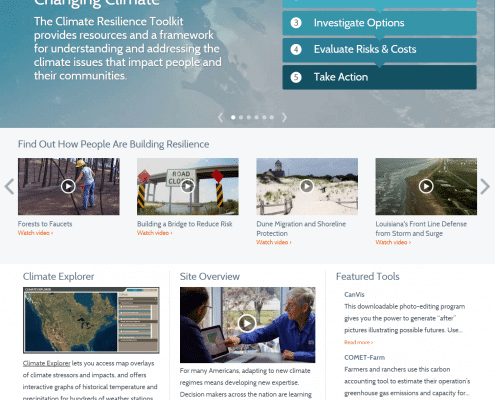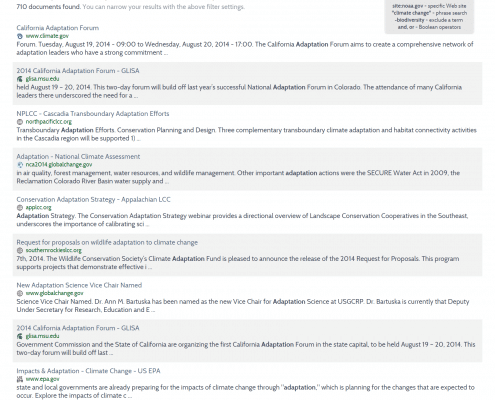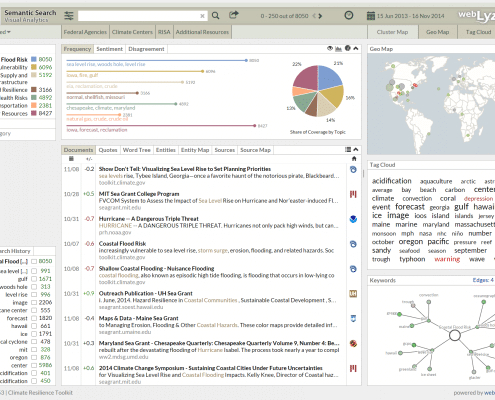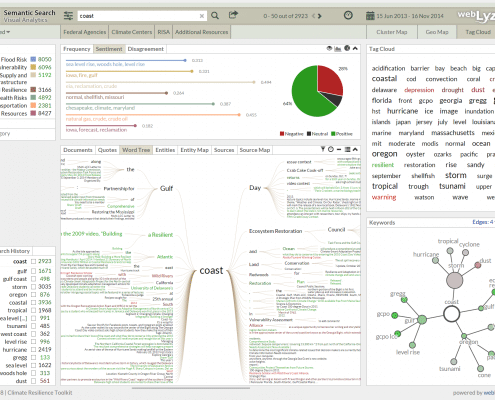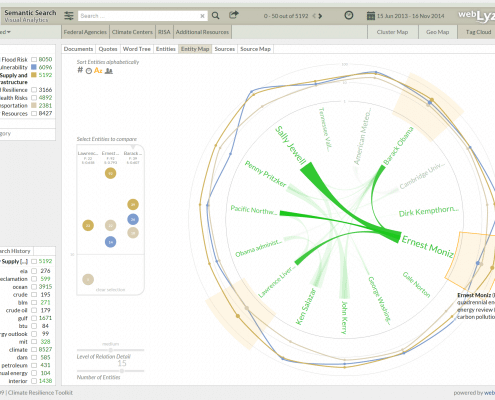US Climate Resilience Toolkit
White House Uses Web Intelligence to Support Climate Initiative
Climate Resilience Toolkit Search powered by webLyzard technology
Following a presentation by former U.S. Vice President Joe Biden, the Climate Resilience Toolkit was released in November 2014. The Toolkit is a decision support initiative that makes use of the innovative text analysis and knowledge visualization services of webLyzard technology. It provides expert knowledge and a suite of analytic components to help citizens and communities manage climate-related risks and opportunities. The webLyzard platform allows these stakeholders to identify the most relevant online content across all agencies of the U.S. Global Change Research Program as well as regional climate science centers.
Try out the system at toolkit.climate.gov
Webby Awards Nomination
The development of the community platform was led by the National Oceanic and Atmospheric Administration (NOAA), which has been using webLyzard’s web intelligence technologies for more than six years. In April 2015, the Climate Resilience Toolkit was nominated for the “Green” category of the Webby Awards – the “Internet’s highest honor” (New York Times), awarded by the International Academy of the Digital Arts and Sciences.
Climate Action Plan
The Climate Resilience Toolkit was developed in response to President Obama’s Climate Action Plan and Executive Order to help U.S. communities, businesses, and state, local, and tribal governments build resilience to climate-related changes and extreme events. The Toolkit provides a public entry point to obtain authoritative information about the impacts of climate variability and change, including a Climate Explorer for geographic projections and various online tools to plan and prepare adaptation strategies. The webLyzard platform powers the Toolkit’s search function, designed to help visitors quickly locate the most relevant content both across all the U.S. federal government’s websites.
Quick Access to Climate Knowledge
The Climate Resilience Toolkit provides quick and effective ways to access online resources. To enable the Toolkit’s semantic search capabilities, webLyzard integrates documents from climate centers and 13 federal U.S. government agencies into a single knowledge repository. Automated methods classify the collected content and enrich documents with high-quality metadata to make them easier to find according to current user needs. webLyzard identifies key topics and actors, summarizes each document and determines its topical, functional, and geographic contexts. The system also integrates linked open data to pinpoint concepts that appear in several different documents, which allows to associate and link these documents.
Users can query the webLyzard platform for their desired type of resource – funding opportunities, data sets, images, etc. – and group search results by a topic of interest. At the same time, communication experts at NOAA can analyze the contained information through webLyzard’s interactive visual tools, allowing them to monitor the stream of new online publications and continuously improve the underlying knowledge repository.
Knowledge Extraction and Visualization
The efficient design and deployment of the semantic search of the Climate Resilience Toolkit is a testament to webLyzard’s sophisticated capabilities to analyze and visualize digital content. The range of these capabilities is further extended by two current research projects, EVOLVE and ReTV, investigate novel approaches to extract and visualize knowledge from online sources in real time. These projects not only analyze news media and corporate communications, but also track emerging stories on social media platforms. A visual dashboard shows relationships among the topics discussed, conveying an in-depth understanding of how the public dialog about these topics evolves.
This ability to detect hidden relations in online content also benefits the users of the Climate Resilience Toolkit. It allows them to freely formulate their queries and then use filter options to narrow down the search results to specific topics or sources. This enriches the functionality of the site for millions of citizens and supports the plans of the White House to foster a more active public dialog about effective strategies to reduce risk and improve resilience to climate-related impacts.
Development of the Climate Resilience Toolkit
The Climate Resilience Toolkit is an inter-agency initiative that operates under the auspices of the United States Global Change Research Program (USGCRP). The site is managed by NOAA Climate.gov, hosted by NOAA’s National Centers for Environmental Information, and developed with partner organizations such as UNC Asheville’s NEMAC and webLyzard technology. The list of participating U.S. Government Agencies includes: Environmental Protection Agency, Department of Energy, Department of State, Department of Commerce, National Aeronautics and Space Administration, Department of Transportation, Department of Agriculture, Department of Defense, Department of the Interior, National Science Foundation, The Smithsonian Institution, U.S. Agency for International Development, Department of Health and Human Services.
References
- Scharl, A., Herring, D., Rafelsberger, W., Hubmann-Haidvogel, A., Kamolov, R., Fischl, D., Föls, M. and Weichselbraun, A. (2017). Semantic Systems and Visual Tools to Support Environmental Communication, IEEE Systems Journal, 11(2): 762-771.
- Herring, D., Communications Director of NOAA’s Climate Program Office: “Assessing the Impact of Science Communication – Strategies and Online Tools”, webLyzard Newsletter (June 2013). www.weblyzard.com/science-communication.


